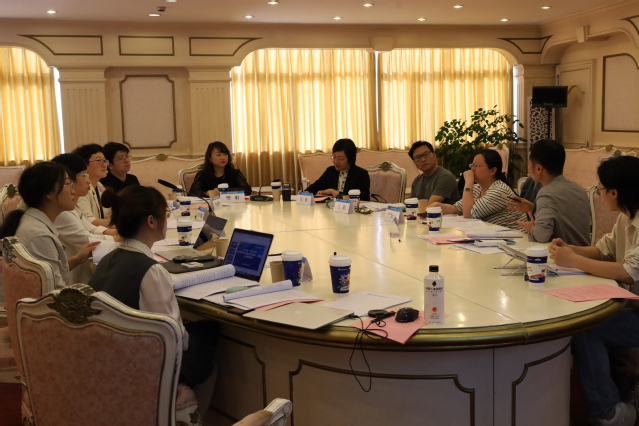

By Lu Zhiyi, Jia Mudi | Photo By Jia Mudi
Shanghai, May 16, 2024 – An academic salon on “International Communication for Generation Z” was held at Shanghai International Studies University (SISU) on May 16. The event, hosted at SISU’s Hongkou campus, was part of a series of seminars under the Ministry of Education’s Major Project on Philosophy and Social Science, titled Research on International Communication Pathways for Chinese Modernization.
The salon brought together over ten experts and scholars from leading institutions, including the Shanghai Academy of Social Sciences, East China University of Political Science and Law, Guangming Daily, Zhongzhou Academy Journal, and Wenzhaibao. The event aimed to deepen the understanding of how to effectively communicate Chinese modernization to global youth, particularly through innovative and engaging formats.
In her opening address, Professor Fan Juan, Party Secretary of SISU’s School of Journalism and Communication (SJC), welcomed the guests and underscored the salon’s relevance to national strategic objectives. She expressed gratitude to the participating experts, emphasizing that the salon would serve as a platform for valuable insights and constructive feedback to inform the project’s research. “We hope that this collaboration will contribute to significant scholarly outcomes,” Professor Fan remarked.
Professor Wu Ying, chief expert of the project, provided the background for the session, explaining that the seminar’s goal was to explore how to enhance the effectiveness of international communication aimed at foreign youth, particularly focusing on popular media formats. The seminar is part of a broader research initiative aimed at exploring communication strategies for the global dissemination of Chinese modernization.
During the session, several presentations were made on key topics related to Generation Z and international communication. Dr. Lü Peng, a researcher at the Center for Film Culture and Audiovisual Communication Studies at the Shanghai Academy of Social Sciences, shared insights into the growing global influence of internet celebrities. Professor Yan Yining, Deputy Dean of SISU’s SJC, presented on the international dissemination of vertical short dramas, a rapidly emerging genre. Professor Wu Ying discussed generational differences in foreign youth’s perceptions of China, while Dr. Qiao Lijuan, Assistant Researcher at East China University of Political Science and Law, provided an academic overview and knowledge map of Gen Z research in international academia.
Li Shengming, Associate Editor of the International Education Section of Guangming Daily, Li Na, Deputy Editor of Academy Journal of Zhongzhou, and Wu Sufang, Editor at Digest News, along with Qian Jin, Associate Researcher at SISU’s SJC, offered commentary and engaged in discussions following each presentation. Experts praised the originality of the research topics and the relevance of the presentations, while also providing constructive feedback. They suggested that researchers strengthen the connection between case studies and the context of Chines modernization to deepen the theoretical framework for international communication targeting Generation Z.
A lively exchange followed, with attendees discussing ways to refine the research, enhance theoretical depth, and improve the practical application of findings in international media strategies.
In closing, Professor Wu Ying expressed gratitude to all participants for their insightful contributions. She emphasized the continued progress of the project and highlighted the importance of ongoing collaboration with both academic and industry partners to advance the research in international communication.
This academic salon provided a valuable platform for deepening the understanding of Generation Z’s engagement with global communication and contributed to SISU’s efforts to explore innovative approaches to promoting Chinese modernization abroad.


 |Hongkou Campus|550 Dalian Road (W), Shanghai 200083, China |Songjiang Campus|1550 Wenxiang Road, Shanghai 201620, China
|Hongkou Campus|550 Dalian Road (W), Shanghai 200083, China |Songjiang Campus|1550 Wenxiang Road, Shanghai 201620, China